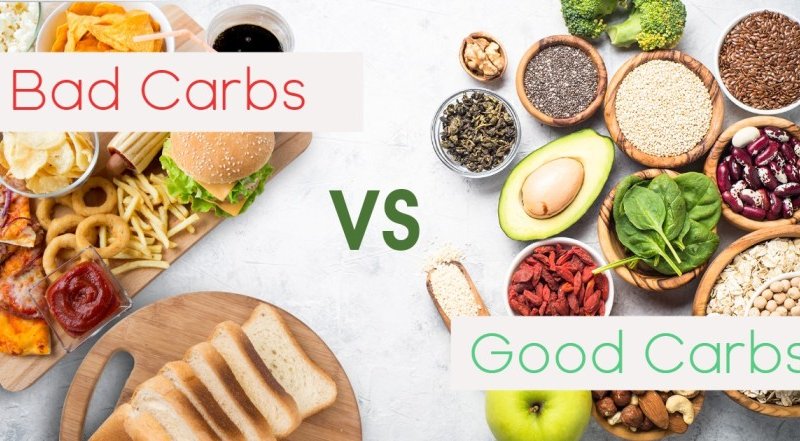Carbs often get a bad rap, especially among health-conscious folks. But the truth is, our bodies need them. Carbohydrates provide the essential energy needed for everything from brainstorming at work to lifting weights at the gym. Contrary to popular belief, cutting out carbs can make it harder to achieve one’s fitness goals. However, this doesn’t mean that all carbs are created equal, nor should they be consumed with reckless abandon. Some carbs are better than others. Here’s what you need to know to make the most of carbs in your diet and enhance your workout routine at AFAC gym in Thornton, Colorado.
What Should Gym Members Know About Good and Bad Carbs?
In the fitness world, carbs are frequently blamed for fat gain and sluggishness, among other things. But are carbs really the villain they’re made out to be?
First, it’s important to distinguish between the different types of carbs. While some can be detrimental, many are essential for fueling the body, enabling you to perform at your best during workouts. Carbs found naturally in plant-based foods are typically the most beneficial. These complex carbohydrates support a healthy digestive system and boost metabolism.
On the other hand, carbs added to processed foods in the form of starches and sugars can have negative effects. These simple carbohydrates are quickly absorbed into the bloodstream, raising blood sugar levels and leading to various health issues.
Understanding the difference between good and bad carbs can help you make smarter dietary choices and enhance your gym performance.
Simple and Complex Carbs
Carbohydrates can be divided into two main types: simple and complex.
Simple Carbs: The Less Desirable Kind
Simple carbohydrates are often referred to as the “bad” kind because they have been stripped of many essential nutrients. These carbs are digested quickly, leading to spikes in blood sugar levels and causing you to feel hungry sooner. This quick digestion and short-lived satiety can result in overeating, weight gain, and increased risk of conditions like diabetes and high blood pressure. Common sources of simple carbs include:
- White bread
- Refined pasta
- Pastries
- Cake
- Non-diet soda
- Fruit juice concentrate
- Packaged cookies
- Breakfast cereal
- Sugar
- Corn syrup
Complex Carbs: The Beneficial Kind
Complex carbohydrates are considered the “good” kind as they are packed with nutritional layers such as bran and fiber, which slow down digestion. This slower digestion leads to a gradual release of glucose, preventing spikes in blood sugar levels. Opting for whole grain alternatives for bread and pasta provides two major benefits: you enjoy the advantages of complex carbs, and you reduce the intake of processed foods high in added sugars.
Types of Carbohydrates: Fibers, Starches, and Sugars
Carbohydrates can be further classified into fibers, starches, and sugars.
Fibers
Fibers are complex carbs found in plant-based foods. Unlike other carbs, fibers are not fully broken down during digestion. Instead, they help digest other nutrients and keep you feeling full longer, which helps prevent overeating. Good sources of fiber include:
- Legumes such as lentils, beans, and peas
- Fruits and vegetables, especially those with edible skin or seeds
- Nuts and seeds
- Whole grains such as quinoa and oats
- Brown rice, whole grain pasta, and cereals
Starches
Starches are another form of complex carbs that function similarly to fiber. They are digested slowly, providing a steady supply of vitamins and minerals. Starches can be found in many of the same foods as fibers:
- Legumes, primarily beans and peas
- Fruits
- Whole grains
- Vegetables, especially corn and potatoes
Understanding the differences between simple and complex carbohydrates, as well as the roles of fibers and starches, can help you make healthier dietary choices and improve your overall well-being.
Sugars: Natural vs. Added
Sugars come in two varieties: natural and added. Both types are simple carbohydrates, meaning they are quickly processed by the body. This rapid digestion leads to a sudden rise and fall in blood sugar, often referred to as a sugar crash.
Interestingly, your body doesn’t know the difference between natural and added sugars. For example, eating a candy bar gives your body sugar but lacks other essential nutrients. In contrast, consuming fruit provides sugar along with beneficial fibers, starches, vitamins, and minerals.
Common names for added sugars include:
- Dextrose
- Fructose
- Lactose
- Sucrose (table sugar)
- Beet sugar
- Honey
- Corn syrup
- Turbinado
- Agave
Understanding the different sources of sugar and their impacts on your body can help you make more informed dietary choices.
Benefits of Healthy Carbs Inside and Outside the Gym
Given this information, it’s clear that healthy carbohydrates offer significant benefits. As the primary fuel source for your body, a deficiency in healthy carbs can lead to adverse effects. Let’s review the advantages that good carbs bring to your body.
Carbs Fuel Essential Bodily Functions
Carbohydrates provide essential energy to several vital organs and systems, including your:
- Brain
- Kidneys
- Heart muscles
- Central nervous system
- Digestive system
Properly fueling these organs helps maintain their strength and function, reducing the risk of conditions like diabetes and heart disease. Additionally, your muscles and liver store extra carbohydrates, ensuring that your body has a reserve of energy when needed.
A diet lacking in sufficient carbohydrates can result in:
- Weakness
- Headaches
- Fatigue
- Difficulty focusing and concentrating
- Digestive problems
- Vitamin and mineral deficiencies
Ensuring an adequate intake of healthy carbs is crucial for overall well-being and optimal body function.
Carbs Don’t Make You Fat
In the past, scientists theorized that carbohydrates contributed to obesity more than fats and proteins. This theory, known as the carbohydrate-insulin model of obesity, suggested that carbs increase insulin levels, which in turn promotes the storage of calories as fat.
While it’s true that overconsumption of any calorie-providing nutrient—be it fat, carbs, or protein—can lead to weight gain, there’s no compelling evidence that high-carb diets are particularly fattening. In fact, numerous studies indicate that there isn’t a significant link between high carbohydrate intake and obesity.
That said, healthy low-carb diets have been shown to be effective for short-term weight loss. Scientists attribute this success to the reduction of refined carbs, such as added sugars, and a greater emphasis on healthy, high-fiber carb sources, along with increased protein and fat intake.
However, a comprehensive 12-month study comparing the effects of a healthy low-carb diet with a healthy low-fat diet found no significant differences in weight loss outcomes.
Ultimately, the quality of the carbohydrates you consume is more important than the proportion of carbs in your diet. Prioritizing whole, nutrient-dense carbs over refined, processed ones is key to maintaining a healthy weight.
Fiber Is an Important Part of a Healthy Diet
Fiber, a type of carbohydrate, plays a crucial role in maintaining optimal health. Nutrition can be complex, but one consensus among experts is the health benefits of consuming fiber.
Dietary fiber, primarily composed of carbohydrates, is essential. Soluble fiber, in particular, is highly beneficial for weight management and heart health. It slows down the digestion and absorption of nutrients, which helps in reducing body weight and enhancing overall health.
Legumes Are a Nutrient-Packed Superfood
Legumes, including beans, peas, chickpeas, lentils, and peanuts, are edible plant seeds that pack a nutritional punch. Often excluded from low-carb diets and strict paleo regimens due to their high carbohydrate content, legumes offer unique health benefits that set them apart.
These nutrient powerhouses are rich in both protein and fiber, making them a rare and valuable addition to any diet. Legumes are also abundant in essential vitamins and minerals. On a calorie-for-calorie basis, they are among the most nutrient-dense foods you can consume, offering exceptional health benefits at a low cost.
Cutting Carbs Doesn’t Improve Your Gym Performance
The idea that a low-carb diet can enhance athletic performance better than a high-carb diet is a common myth. In fact, a well-designed study involving cyclists in a 62-mile (100-km) trial with intermittent sprints found that participants who followed a high-carb diet for a week prior to the test outperformed those on a low-carb diet in sprint output on all four occasions, despite having similar overall race times.
Although one study alone doesn’t provide definitive proof, the broader body of evidence supports these findings. Athletes on a low-carb diet can still perform well, but no high-quality research indicates that reducing carbs will allow them to outperform those on higher-carb diets. This is true for both cardio endurance activities like cycling and strength-based exercises such as weight training and bodybuilding.
For those exercising at the gym to maintain fitness, a low-carb diet is unlikely to harm performance, but it’s also unlikely to offer any significant improvement.
Carbs Are the Key to a Great Workout at the Gym
For an effective workout, carbs are essential. Without them, sustaining the energy needed for intense exercise is challenging. The amount of carbs required varies based on the intensity and frequency of your workouts, along with factors like age, gender, and weight. While individual needs and preferences vary, 30% to 65% of your daily caloric intake should come from carbs. Highly active people might need more.
For instance, marathon runners often increase their carb intake before a race. If you’re preparing for a significant event requiring a lot of energy, consider boosting your carb intake by around 100 grams daily in the days leading up to it. For regular workouts lasting at least an hour, consuming a 200-calorie carb snack about an hour beforehand can help optimize your performance.
Carbs Aid in Post-Workout Recovery
Carbs are essential not just for powering your gym workout but also for supporting recovery and muscle growth afterward. Opt for a small post-workout snack that combines protein and carbs to replenish your glycogen stores. This practice aids in recovery, prepares your body for the next session, and ensures you have enough energy to stay active throughout the day. To maximize benefits, pack a non-perishable snack and consume it within 30 minutes of completing your workout at the gym.
Good Carbs Can Be Your Workout Ally at the Gym
Carbs aren’t the enemy; they are crucial for your workout, providing the energy you need to perform. They also play a vital role in recovery and muscle growth. Avoiding carbs can negatively affect your mood and hinder fitness efforts. So, go ahead and enjoy complex carbs in moderation—they’re good for you!
If you’ve been searching for the perfect local gym, we hope you’ll stop by AFAC to take a tour of our gym and speak to our team about our affordable memberships. AFAC gym is committed to supporting your health and wellness efforts, so you’ll see the results you’re working so hard for. That’s why we were voted the best gym in Thornton, Colorado, and have hundreds of 5-star reviews.
To learn more about our top-rated gym and our incredible array of strength training and cardio equipment — as well as our unique offerings and amenities like daily group classes, cryotherapy, InBody 770 assessments, hydro massage, and our rock climbing wall and cave — we hope you will contact us or visit for a personalized tour. Our team will be happy to help you. For more information and assistance, you can also contact our gym owner, Susan, at 720-849-0245 or susan@adventurefitness.club.




